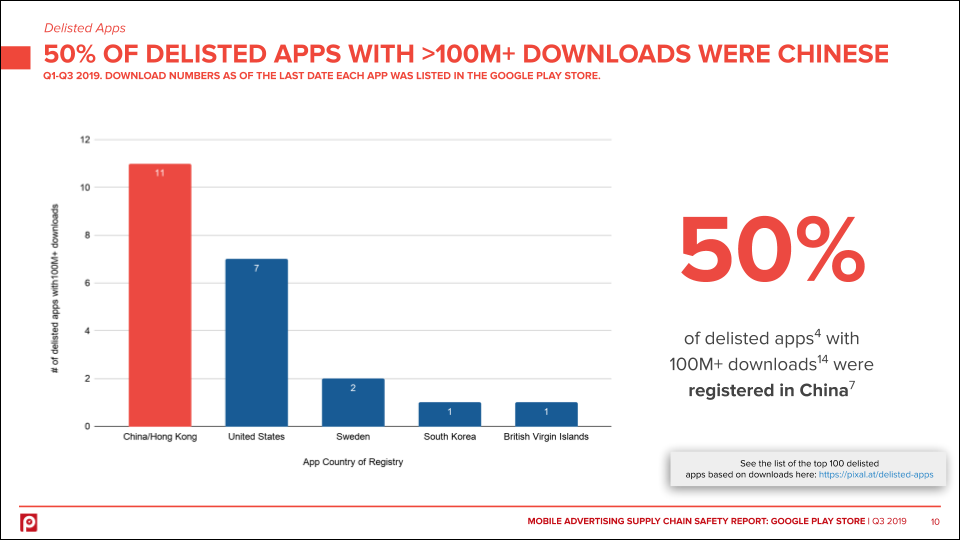
Nearly 881,000 apps were delisted from the Google Play Store from Q1-Q3 2019. But how many of those apps were popular — and where did they originate?
Pixalate's 2019 Mobile Advertising Supply Chain Safety Report reveals that the majority of the most popular apps delisted from the Google Play Store through Q3 2019 were Chinese.
According to Pixalate's research, there were 22 apps delisted from the Google Play Store that had over 100 million downloads at the time of their delisting.
Of those 22 apps, 11 of them — or 50% — were registered in China (including Hong Kong).
The United States (7 apps), and Sweden (2 apps) were the only other countries that had multiple 100M+-downloaded apps delisted.
South Korea (1) and British Virgin Islands (1) each had an app that had 100M+ downloads prior to delisting.
You can see the top 100 most popular delisted Google Play Store apps here, including the 22 apps referenced above.
Download a free copy of the 2019 Mobile Advertising Supply Chain Safety Report to learn more.
Disclaimer
The content of this blog reflects Pixalate's opinions with respect to the factors that Pixalate believes can be useful to the digital media industry. Any proprietary data shared is grounded in Pixalate's proprietary technology and analytics, which Pixalate is continuously evaluating and updating. Any references to outside sources should not be construed as endorsements. Pixalate's opinions are just that, opinions, which means that they are neither facts nor guarantees.
"Delisted apps" include apps delisted on or after January 1, 2019 and not on the Google Play Store as of September 30, 2019. Delisted apps cannot reflect the initiator of the delisting action, i.e. Google or the app developer.
*By entering your email address and clicking Subscribe, you are agreeing to our Terms of Use and Privacy Policy.
These Stories on Mobile
*By entering your email address and clicking Subscribe, you are agreeing to our Terms of Use and Privacy Policy.

Disclaimer: The content of this page reflects Pixalate’s opinions with respect to the factors that Pixalate believes can be useful to the digital media industry. Any proprietary data shared is grounded in Pixalate’s proprietary technology and analytics, which Pixalate is continuously evaluating and updating. Any references to outside sources should not be construed as endorsements. Pixalate’s opinions are just that - opinion, not facts or guarantees.
Per the MRC, “'Fraud' is not intended to represent fraud as defined in various laws, statutes and ordinances or as conventionally used in U.S. Court or other legal proceedings, but rather a custom definition strictly for advertising measurement purposes. Also per the MRC, “‘Invalid Traffic’ is defined generally as traffic that does not meet certain ad serving quality or completeness criteria, or otherwise does not represent legitimate ad traffic that should be included in measurement counts. Among the reasons why ad traffic may be deemed invalid is it is a result of non-human traffic (spiders, bots, etc.), or activity designed to produce fraudulent traffic.”

